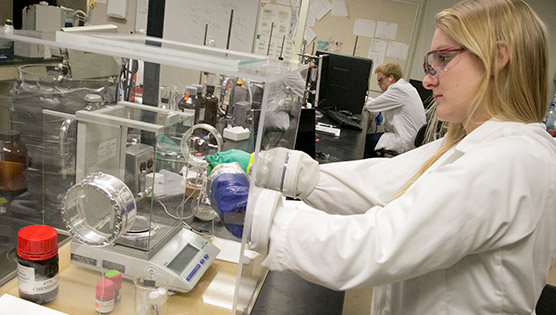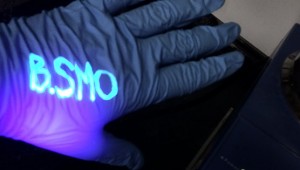
Brittany Smolarski in the lab
Major: Biochemistry and Molecular Biology
Research Mentor: Dr. Jason Kingsbury
Brittany participated in full-time research during the summer of 2014 through a Swenson Summer Research Fellowship and through a John Stauffer Research Fellowship in Chemical Sciences in 2015. Both grants are awarded through the Office of Undergraduate Research and Creative Studies.
Why participate in the Swenson Summer Research Fellowship?
The Swenson Summer Research Fellowship has provided me with the opportunity to not only expand my organic chemistry knowledge, but to also delve into the world of scientific discovery and grow as a student, researcher, and a person. I believe that the work I did this summer has prepared me for the demands I face in pursuing medical school by allowing me the opportunity to develop the skills to interpret data, analyze information, and drive the intellectual process.
What is the name of your project? How would you describe it to fellow students of all majors?

DANPY-1 Fluorescing Under UV Light
My project is entitled: “Optimization of a Scalable Synthesis of DANPY-1 and Variants, Novel Dye Molecules for High-Impact Biological Imaging”
Intracellular fluorescence staining, a common microscopy technique used to enhance image contrast, utilizes dye molecules for DNA visualization and study. Currently, ethidium bromide is the most widely used biological stain, however, it is extremely toxic and requires involved procedures for its use and disposal, pressing the need for other non-toxic dyes that stain DNA as efficiently. Our collaborators at the University of Washington identified a molecule, DANPY-1, which demonstrates dye characteristics similar to that of ethidium bromide. The difference is that DANPY-1 is bench stable and non-toxic, making it much safer than other dyes, including ethidium bromide. The first generation synthesis of this dye molecule was very low yielding. I like to compare this to baking cupcakes. We had a recipe that worked, but only made about eight cupcakes. The problem is that we were planning to host a party of over two hundred people and wanted everyone to be able to have at least two cupcakes, if not more. So we needed to drastically improve our recipe, in the case of DANPY-1 by using different organic chemistry reactions and techniques, so that we could make a lot of cupcakes for our party! Thus, the aim of our study was to develop and streamline a highly efficient synthesis in order to facilitate further study of the fluorescence and biological applications of this molecule. Additionally, we created a variant to DANPY-1, called DANPY-2, that is slightly different in structure, but is also being further studied.
What did you learn doing your project? What was your key takeaway?
My key takeaway from my research is that doing something you love and something that interests you never feels like work. I know it sounds cliché! But during this project, I’ve learned that I love research and all the prospective future implications it brings to the table. There were days over the summer where I worked from 8 am to 8 pm, not because I was ever forced, but because I was happy to be there working on this project, learning new techniques and knowledge from Dr. Kingsbury and trying to create a molecule that I believe has tremendous impact for future research and development. I also learned that there are always setbacks and issues that arise, but that every obstacle teaches you something about what you’re working on. No result is ever a bad result! For all of these reasons, I am certain that I want to continue research throughout my medical career and work to advance the field of surgical medicine. In this manner, my project has helped me to define the intricacies of my future career goals.
What has surprised you about your experience at Cal Lutheran, inside or outside the classroom?
I came to Cal Lutheran as a freshman, expecting it to be a very straightforward, checklist-type educational experience. I was surprised to discover that education at Cal Lutheran is really what you choose to make of it. What you put in is what you will get out.
My story began as I learned more and became extremely interested in chemistry. All I had to do was ask about chemistry research and I was invited to observe the researchers’ lab over the summer, try my hand at it, and continue if I liked it. I loved it, and as my knowledge of Organic Chemistry grew, I began talking more and more to Dr. Kingsbury about his projects. Towards the end of my sophomore year, Dr. Kingsbury told me he had a specific project he wanted me to work on, and I spent my entire summer working in the lab, working hard, gaining more knowledge and having more fun than I had ever expected. In addition to that, I gained a mentor who supports my ever-growing desire for more chemistry knowledge as well my future goals.
At Cal Lutheran, if you’re interested in something, the faculty are there to speak with you one-on-one, fuel your interests, and provide you with the necessary outlets to help you grow your knowledge and experience. I think that is what makes Cal Lutheran so unique and such a wonderful place to gain a college education. The best part is that while this is true especially of the science faculty, it’s also true of all of the faculty in all the various divisions I’ve encountered in my time at CLU – from philosophy, to sociology, to psychology faculty – they’re all amazing and eager to help you learn about what interests you most!
What is your goal after graduation?
After graduation, I’m hoping to immediately begin medical school. My career goal is to become a surgeon and be able to utilize my research experience to further the field of surgical medicine. I’ve got quite a few more years of schooling ahead of me, but because of the experience and knowledge I’ve gained at CLU, I feel prepared and more excited than ever to begin that journey.
